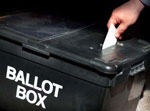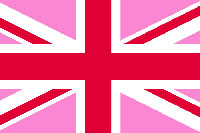UK no longer top of the class for equality
June 2024 Simon Williams, PinkUk
Why has the UK tumbled down the global LGBTQ+ equality rankings?
An in-depth article for people interested LGBTQ+ equalities in the UK.

The UK was once Pinker than it is today; no, this isn't about the colour of its vast former empire on old maps, but about its top-of-the-class ranking in the 2010s as a beacon for the world on LGBTQ+ equality.
…yet recently the UK has plunged in the LGBTQ+ global rankings tumbling to the same rung on the ladder as countries in Eastern Europe. What went wrong?
If you're a UK resident, unless you've been living under a pink toadstool deep in a remote (obviously queer) forest for the past few weeks, you'll know that a snap UK general election has been called for Thursday next week 4 July.
As with all UK voters, LGBTQ+ identifying people will have their first chance in nearly five years to announce their verdict on 14-years of Conservative Party rule.
The election is an opportunity to show some Pink Power and help raise long-standing issues of discrimination that still, perhaps surprisingly, lurk in shadowy corners of everyday life for many in the UK LGBTQ+ communities.
When you vote, it’s important to know the landscape, what’s changed and what needs to change. Perhaps most puzzling is that despite all the headline advances in legal rights, the UK year-by-year continues to slide down the LGBTQ+ league tables relative to other Western countries, from being one of the friendliest and most progressive countries for LGBTQ+ people in the world in the mid-2010s to an about average, middle-ranking country in Europe, on the same rung of the ladder as Croatia and Montenegro today.
Just about average. The UK is now ranked behind most of western Europe on LGBTQ+ equality.
As Stonewall, the UK LGBTQ+ lobby group, recently said, nine years ago the UK was top of the class for LGBTQ+ legal equality in Europe, the high watermark being the UK’s passing into law same-sex civil marriage in 2014 under the then Tory-LibDem coalition government led by PM David Cameron.
So what’s happened?
The International Lesbian and Gay Association Europe (ILGA) publishes annually one of the most comprehensive reviews of countries for LGBTQ+ equality in the world. Every European country and some central Asian states are assessed and graded with a report on trends from the previous calendar year. The highlight is ILGA Europe’s Rainbow Map. At glance, you can see the rankings for each country on the map and in a table. It’s the LGBTQ+ human rights equivalent of the judges announcing results of the Eurovision Song Contest but this isn’t about pop music, it’s about justice, people’s lives, their safety and freedoms.

Disappointingly, the UK has slipped yet again from a 53% score for 2022 (reported in 2023) to 51.9% for 2023. It is now, literally, the most average country in Europe across a table listing 48 countries. What’s more, it’s not hard to do well as the list includes such unfriendly LGBTQ+ watering holes as Russia and Azerbaijan.
Back in 2015, it was very different; the UK was the gold medal winner, topping the table with an 86% score. So it’s a huge drop in rank. This year, the tiny Mediterranean island and former British colony, Malta, won the gold medal with an 87.8% score - and they have the weather. So unfair.
Let’s be clear what this means: in less than ten years, the UK has plummeted from being top of the class to level-pegging with countries in Eastern Europe.
In April 2023, the United Nations Human Rights 'Independent Expert’ for LGBTQ+ policy, Victor Madrigal-Borloz, a lawyer from Costa Rica, touched down in the UK to see what was going on. After his ten-day visit, he published a 18-page report. The irony was stark. His report reads like a UN official offering a developing country sage advice as it tentatively takes its first steps to liberalise LGBTQ+ laws. The last time I checked, the UK was a member state of the G7 Group of large Western economies, NATO, the UN Security Council and has been historically at the vanguard of LGBTQ+ equality. It partly legalised male to male sexual relations in 1967, almost 60 years ago.

Madrigal-Borloz noted the “widespread toxic discourse” from politicians, media and social media and the “spreading anti-trans discourse and stereotypical imagery of LGBT persons.”
He urged the UK government to “reject any efforts to remove or diminish existing human rights protections under the law and policy frameworks of the United Kingdom – including the protection of refugees under the asylum system and protection of trans persons under the Equality Act 2010.”
ILGA Europe’s report echoes the UN’s. In a compact three-page assessment on the UK, it suggests much of this disappointing performance has been driven by the experiences of the UK’s Trans community. While homophobic crime dropped by 6% over the previous year, crimes against Trans people climbed by 11%. And other European countries are simply advancing more quickly in their civil rights and social attitudes than the UK; it doesn’t mean that the situation in the UK has necessarily drastically deteriorated over the previous year.

ILGA Europe uses a basket of seven indicators including equality & discrimination, family, hate crime & speech, asylum experience and legal gender recognition, among others to calculate the country score.
ILGA Europe and the UN are not alone. The same trends can be seen at another LGBTQ+ monitoring site Equaldex, a collaborative editing site in the same way as Wikipedia. It tracks changes in LGBTQ+ equality across the globe. According to Equaldex, the UK now lags behind most west European countries in its overall LGBTQ+ equality ranking, falling behind France, Germany, Spain and the Netherlands. Similar to ILGA Europe, Equaldex also has an impressive map of the world which enables you to compare every country on the planet by placing your cursor over it to display a country’s score on LGBTQ equality and public attitudes to LGBTQ+ communities. The darker the green the friendlier to LGBTQ+ rights. Equaldex monitors overall equality, the legal landscape and public opinion, among other indicators.
The rise of ‘new’ homophobia and transphobia

Since the legalisation of same-sex marriage in England & Wales in 2014, anti-LGBTQ+ and particularly anti-Trans sentiment in the UK media, and among right-wing influencers in the UK, has become more pronounced. Much of the national UK media is notorious for its febrile sensationalism and right-wing bias, a trait that reactionary homophobic and transphobic polemicists exploit alongside social media.
These opponents of Trans equality contest the right of young people to make their own decisions and to access advice and support in privacy with health professionals. They reject anything outside their narrow idea of what CIS gender identity should be. Alongside this, is the complex debate around male-to-female Trans people competing in women’s sports.
There’s also been a backlash against what some people call ‘Woke’ or ‘politically correct’ policies more generally in society; the LGBTQ+ communities have found themselves caught in the cross-fire in culture wars between Right and Left; this trend originated in America but we feel it in the UK.
Despite the historic advances in laws such as same-sex marriage, homophobia and transphobia are still deeply embedded in sections of UK society. They won't disappear anytime soon. We have a duty to understand each other’s point of view respectfully and acknowledge that sometimes there are different and yet legitimate views on both sides on how to resolve some of the challenges around Trans and women’s issues.

The influence of the United States
What happens there usually comes over here. There’s the creeping threats to the recent hard-won rights for the LGBTQ+ communities in America, notably the right to same-sex marriage everywhere in the US which hangs by a thread, at the whim of the country’s ultra conservative Supreme Court. The fear is that the Court could at some point overturn or limit same-sex marriage in the same way that a woman’s constitutional right to an abortion anywhere in the United States was overturned two years ago. Then there’s the legislation against LGBTQ+ school books being passed at state level. The Court has already legitimised the right for creative commercial suppliers such as graphic designers to discriminate against same-sex customers, if it conflicts with their faith beliefs - see PinkUk’s article. All this casts a shadow for the UK and the rest of Europe.
Unfinished business: the promise to ban conversion therapies in the UK

Then there’s the controversy (why it should be a controversy is a question in itself) on banning conversion ‘therapies’. Such practices seek to convert people to a heterosexual identity and to return them if needed to the gender they had at birth (also known as ‘CIS’).
For the individual who experiences them, it can be emotionally or physically harmful depending on the therapy involved and there is little evidence these techniques actually succeed, even if one were to consider the objective to be a desirable outcome. Practices range from mild faith, family and peer group influence and pressure to the threat of compulsory treatment and medication or worse. PinkUk has covered conversion therapies in more detail.
The political debate about whether to outlaw such practices has been dragging on for years in the UK. Six years ago, the now out-going government pledged to outlaw conversion therapies but it never honoured its promise. In 2022 the Tory government even proposed a discriminatory approach where by conversion therapy would be outlawed for LGBQ (minus the T) communities, excluding protection for Trans people.
The government back-pedalled quickly when the proposal rang alarm bells with over a hundred UK LGBTQ+ related organisations including the Terrence Higgins Trust and 22 other HIV charities. Other countries have found it a smooth affair to introduce blanket protections for everyone in the LGBTQ+ communities including Trans; countries where there are bans include France, Spain, Germany, Belgium, Portugal, Canada, Brazil, even Vietnam.
Use your vote

Looping back to our surprise summer election - well, a surprise to most of us, that is - even if not to those MPs who took advantage of their insider knowledge to have a betting flutter on its date. General elections are not just about voting, they're also an opportunity to scrape away the tedious political hype and sensationalism of everyday politics and media reporting. Instead, it’s a time to demand that candidates and their parties put on the table the ‘real deal’ that they're offering the LGBTQ+ communities. In other words, their manifesto promises as they affect you, your partner, friends and family, your community directly and the LGBTQ+ communities as a whole; what they can do in fact and how it will be paid for and when will the change, if needed, happen?

PinkUk asked global human rights campaigner Peter Tatchell what he thought. "It's a shocking indictment of the failings of the Conservative government that Britain has slipped so far down the LGBT+ rights league table,” said Peter.
“This is partly due to the Tories reneging on their promise to ban conversion practices, stirring anti-trans culture wars and blocking trans self-ID in Scotland.”
Peter added, “It's also because of their ill-treatment of LGBT+ refugees fleeing persecution and the huge cuts in sexual health budgets that have particularly adversely impacted gay and bisexual men. These are all good reasons to not vote Conservative in the upcoming election."
Could the UK regain its position as the ‘pride of Europe’ on LGBTQ+ rights?

That depends on how the new government honours its manifesto promises. PinkUk Towers hopes the election will open the door to a fresh, progressive approach to tackle some of these challenges.
If the in-coming government is able to commit to protect the Trans community, ban conversion therapies, as Labour pledges to do, help promote a less toxic cultural debate and show a stronger commitment to human rights more generally for all the LGBTQ+ communities, then we could see the UK climb back up the ladder, a place where it rightfully belongs.
PinkUk doesn't endorse any political party, well, only the Pink Party, but we urge you to look over the main parties’ manifestos carefully. There are also many quick easy-to-read articles in the LGBTQ+ or mainstream media which explain each party’s position. (See links below).
Remember that whatever party colour you choose to vote for (whether red, green, blue, yellow or other) the one colour that really matters is PINK.
Simon Williams writes on civil liberties, equalities and related topics.
Notes
The main parties (there are many others) in England: Conservative (Tory), Green, Labour, LibDem and Reform. In Scotland and Wales there are nationalist parties, notably the SNP in Scotland and Plaid Cymru in Wales. Northern Ireland has a different political landscape with most parties falling one side or another between the Unionist or Nationalist communities. There is also the non-sectarian Alliance Party and the Northern Ireland Green Party.
What the parties say on LGBTQ+ equality in 2024
Media articles looking at the main parties’ LGBTQ+ policies ahead of the election:
Attitude UK
Metro UK
transgendertrend.com
Useful resources
Rainbowmap
ourworldindata.org
ohchr.org
Sign up to our monthly newsletter to get interesting content.




